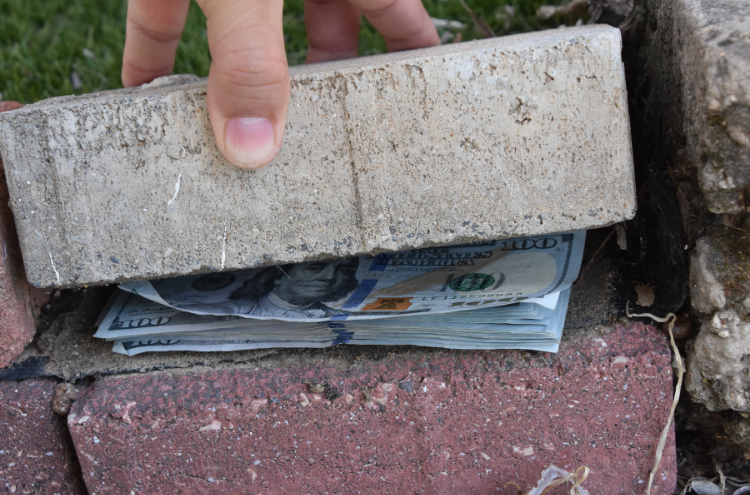1. What is an emergency fund and when should you use it?
An Emergency Fund is money that you set aside and save for times when your usual monthly paychecks or the money you have budgeted won’t cover an expense. Everyone has their own idea of what an emergency is based on their level of preparedness. We will touch a bit on this below, but it is good to establish what you feel an “emergency” actually is for your own personal finances.
As much as an emergency calls to mind sirens and trips to the ER, generally it’s not a totaled car that needs replaced or a child that needs a lung transplant that will require a withdrawal from this account, thank God! Most of the time it’s more like a water heater going out in the middle of the night or racoons building a home in your chimney. What it probably shouldn’t be used for is a good sale on high heels at Sacs Fifth Avenue or half off cosmetic botox. I say “probably” though because the beautiful thing about personal finances? It’s PERSONAL!! I don’t get to say what an emergency looks like for you! But I can (and will) give my 2 cents on how an Emergency Fund works and how to keep from constantly being depleted.

2. How much should I save in my Emergency Fund?
It is pretty widely suggested that as you are beginning to build a budget and preparing for your future that an emergency fund of $2-3k should be one of your first priorities. Do emergencies greater than $3000 ever happen? You bet! But by setting up a little bit of savings upfront before you start hammering away at your debt, you will have money to pay for most things that could derail you on your path to financial wellness. Thankfully, most car expenses are less than $3000. Most deductibles for homeowner policies or car insurance policies are less than $3000. And usually you can get a new water heater and your furnace fixed (though not replaced) for under $3000.
Are there exceptions to this? Yes siree Bob! For example, this money will do very little if you should lose your job or need a new car. But it’s a start. Build this up and start on the road to financial health and peace of mind. Don’t build up your emergency fund excessively. It’s important to start paying off your lenders unless you are in a high risk group. High risk groups could include those prone to layoffs.
I personally recommend that you get your non-mortgage debt paid off while simultaneously meeting any match from your employer’s retirement plan. Do this all before you max out your Emergency Fund. Put simply: your first priority should be saving $2-3k. While saving this, meeting your work’s retirement match. Then pay off your non-mortgage debt followed by maxing out your Emergency Fund with 3-6 months of your wages. Whether you go on the low or high end here depends upon your life circumstances.
If you’re a contracted employee, you’re laid off often, have poor health, are a single parent, or are a single wage earning family, then it’s probably wise to pursue a 6 month emergency fund. If you’re a 2-income family, have other income streams, or have good paying, stable jobs with plenty of money leftover at the end of each pay period then perhaps 3 to 4 months savings will suffice for you. Again, you get to choose. Make your finances personal!
3. Where should Emergency Fund Money be Kept?
Emergency Fund money should be seen as an insurance policy in case of you get in a financial bind. What it is not is an investment. It’s painful to set thousands of dollars into savings, under your mattress, or in a can in the backyard. But it’s not there as an investment or to earn more money. It’s there to keep you from falling into a crisis if an emergency arises.
That being said, I do recommend that you not keep it at home where there is too much risk. I advise that you at least put it into a bank account where it can build a bit of interest. At the time I’m typing this, interest rates on high interest savings are not great. Even then, I still clear about $5 a month on money that would make nothing here at home. The best part, it’s accessible if I need it!!
I like to keep mine separate from my bill-paying accounts. It makes me follow some added steps to access it. And requires me to log into a different app on my phone to transfer the money into a spendable account. It would be too easy to spend it if it was just one click away from my checking account. I keep them in separate banks altogether. The choice where you keep yours is personal. Make sure it’s not put into an investment that requires cashing out or filing taxes after taking it out. This is supposed to help your stress level, not heighten it. Should all your money be in this account?

4. Keep some money on hand
While I think it’s wise to keep your money in an account, I do think keeping some cash at home to have on hand is helpful. Whether it be to provide for tooth fairy money or to flee with in case of domestic emergency, it’s a good idea to at least have some cash on hand. This isn’t part of your emergency fund and probably isn’t money that you would use in the same capacity. But I think not having cash on hand when you need it can create an emergency of its own variety.
If you are someone who feels unsafe at home, hide money a bit at a time so it’s not missed. Don’t tell anyone where it’s at but make sure it’s very easy for you to access if you need help!
I personally like to keep between $500 and $1000 on hand hidden at any given time, but we all have our own comfort level. Me with my 3 kids may require hundreds to feel comfortable. A single person with no dependents may be content with a $10 bill. Personal finances are a beautifully personal thing!
5. Miser or Over-user?
As I eluded to above, there is a balance between refusing to use an emergency fund unless it’s an absolute emergency and relabeling non-emergencies to fit your agenda for spending. I tend to fit in the miser category. As someone who has rarely had extra in my adult life, it’s hard for me to have my emergency fund numbers go down and push my budget to its max sometimes.
Case in point: I had $1800 of van repairs and maintenance work unexpectedly this last month. I have dragged my feet pinching pennies in hopes that my income would cover it long enough for me to pay off my monthly credit card bill. In the process, I have stressed every time I’ve opened my budgeting app and seen it in the red. If I had been less of a Scrooge and transferred $900 up front instead, I would have given myself much more peace of mind. And it’s not like I can’t send that money back to the EF if I don’t use it, right?! So please try and find that elusive balance between miser and over user.
6. Pay yourself first
I used to transfer money to my emergency savings with what was left in my bank account at the end of the month. I learned quickly that if the money is in my budget unallocated, it’s really easy to spend it. Put your money that has been allocated for your savings in at the beginning of the month before bills are paid. If your budget is set, you have a pretty decent idea of what you’ll need to pay your bills. And if you go over on account of an emergency, voila, you have an emergency fund for this! Genius, right?!?
7. Automation
Automation is your friend. Oftentimes employers let you set up to have money transferred automatically to separate accounts. I use this feature to transfer money to my Roth IRA and my Emergency Fund. It’s money I never see in checking so I don’t even miss it.
If your employer doesn’t do this, you can set up repeat transactions within your own banking account to transfer the money on a designated day every month. I have accounts that do this for my payments. Transferring money with the intention of saving it can be done with this same process. This allows you to take the thinking out of the process. Allows you to get out of the way and the money to grow uninhibited. You’ve programmed the account to take $xx out every 2 or 4 weeks. It’s almost like that money never existed and you’ve magically got a cash reserve for a stormy day.
8. Consider Sinking Funds
Instead of using Emergency funds for expected but surprise expenses every time they come up, consider setting up some sinking funds in your budget. You know you’ll eventually have tires that need replaced or a child that will need braces, so save a little bit every month within your budget to make this happen. Same goes for Christmas. It conveniently comes back every December just like your family members’ birthdays. You know you’ll need to buy gifts so set some money aside a bit at a time. It hurts less that way.
9. What are you waiting for?

And last but certainly not least, don’t put off doing this but also don’t overdo it. Get your $2-3k saved like the boss that you are and get chipping away at your debt. Don’t overthink it but set a goal of an amount and when you reach it reward yourself with a small (defined as inexpensive!!) reward and get going on creating a less stressful financial environment by getting rid of your debt. 💛
